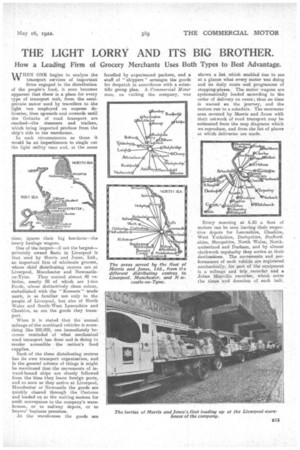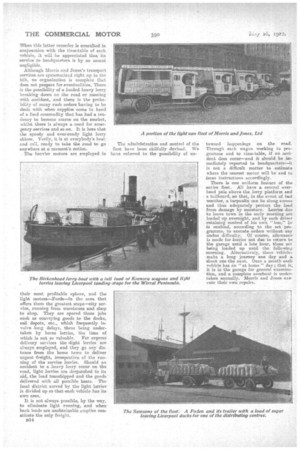THE LIGHT LORRY AND ITS BIG BROTHER.
Page 11

Page 12

If you've noticed an error in this article please click here to report it so we can fix it.
How a Leading Firm of Grocery Merchants Uses Both Types to Best Advantage.
WHEN ONE begins to analyse the transport services of important firms engaged in the distribution of the people's food, it coon becomes apparent that there is a place fur every type of transport unit, from the semiprivate motor used by travellers to the light van employed on express deliveries, then upwards and onwards until the Goliaths of road transport are reached—the steamers and trailers, which bring imported produce from the ship's side to the warehouse.
In such circumstances as these it would be an impertinence to single out the light utility vans and, at the same time, ignore their big brethren—the heavy haulage wagons.
One of the largest—if not the largest.— privately owned fleets in Liverpool is that used by Morris and Jones, Ltd., an important firm of wholesale grocers, whose chief distributing centres are at Liverpool, Manchester and Newcastle
on-Tyne. They control almost 40 yebridles, nearly 20 of which are 1-ton Fords, whose distinctively clean colour, embellished with the " Keenera " •trade mark, is as familiar not only to the people of Liverpool, but also of North Wales and South-West Lancashire and Cheshire, as are the goods they transport.
When it is stated that the annual mileage of the combined vehicles is something like 300,000, one immediately becomes reminded of what mecheeical road transport has done and is doing to render accessible the nation's food supplies.
Each of the three distributing centres has its own transport organisation, and in the general scheme of things it might be mentioned that the movements of inward-bound ships are closely followed from the time they leave foreign ports, and so soon as they arrive at Liverpool, Manchester or Newcastle the goods are quickly cleared through the Customs and loaded on to the waiting motors for swift conveyance to the company's warehouses, or to railway depots, or to buyers' business premises.
At the warehouses the goods are
handled by experienced packers, and a staff of " shippers " arranges the goods for despatch in accordance with a scientific group plan. A Commercial Motor man, on visiting the company, was
shown a list Which enabled one to see at a glance what every motor was doing and its daily route and programme of stopping-places. The motor wagons are systematically loaded according to the order of delivery en route; thus no time is wasted en the journey, and the motors rim to a schedule. The enormous area covered by Morris and Jones with their network of road transport may be estimated from the map diagrams which we reproduce, and from the list of places at which deliveries are made.
Every morning at 6.30 a fleet of motors can be seen leaving their respective depots for Lancashire, Cheshire, West Yorkshire, Derbyshixe, Staffordshire, Shropshire, North Wales, Northumberland and Durham, and by almost clockwork regularity they arrive at their destinations. The movements and performances of each vehicle are registered mechanically, for part of the equipment is a mileage and trip recorder and a Johns Manville reconder, which notes the times and duration of each halt. When this latter recorder is consulted in conjunction with the time-table of each vehicle, it will be appreciated that its service to headquarters is by no means
Although Morris and Jones's transport services are systematized right up to the hilt, no organization is complete that does not prepare for eventualities. There is the possibility of a loaded heavy lorry tweaking down on the road or meeting with accident, and there is the probability of many rush orders having to be dealt with when supplies name to hand of a food commodity that has had a tendency to become scarce on the market, whilst there is always a need for emergency se-rvices and so on. It is here that the speedy and ever-ready light lorry shines. Verily, it is at everybody's henk and call, ready to bake the road togo anywhere at a moment's notice.
The heavier motors are employed in
.their most profitable sphere, and the light motors—Fords—in the area that offers them the greatest scope—city service, running from warehouse and shop to shop. They are spared these jobs snail as conveying goods to the docks, rail depots, etc., which frequently involve long delays, these being undertaken by horse lorries, the time of -which is not so valuable. Fot express delivery services the Allight lorries are always employed, and they go any distance from the home town to deliver urgent freight, irrespective of the running of the service lorries, Should an accident to a heavy lorry °clour on the road, light lorries are despatched to its aid, the load transhipped and the goods delivered with all possible haste. The local district served by tho light lorries is divided up so that oaoh vehicle has its own area.
Ibis not Always possible, by the way, to eliminate light running, and when back loads are unobtainable empties C011, stitute the only freight.
1314 The administration and control of the fleet have boon skilfully devised. We have referred to the possibility of un
toward happenings on the road. Through each wagon working to programme and to time-table, if an accident does occur—and it should be immediately reported to headquarters—it is not a difficult matter to estimate where the nearest motor will be and to issue instructions accordingly.
There is one uniform feature of the entire fleet. All have a central overhead pole above the lorry platform and a tailboard, so that, in the event of bad weather, a tarpaulin can he slung across and thus adequately protect the load from damage by moisture. Lorries due to leave towm in the early morning are loaded up overnight, and by each driver retaining control of his own "bus," he is enabled, according to the set programme, to execute orders without any undue difficulty. Of course, allowance is made for lorries not due to return to the garage until a late hour, these not being loaded up until the following rnerning. Alternatively, these vehicle make a long' journey aria clay and a Short one the next. Once a month each vehicle has an "at home " day; that is, it is in the garage for general examination, and a complete overhaulis undertaken annually. Morris and Jones execute their own repairs.
































